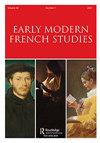朗萨德与阿斯提纳克斯之魂
IF 0.2
3区 历史学
Q2 HISTORY
引用次数: 1
摘要
本文考察了1550年至1578年朗萨尔作品中弗朗西翁史诗人物的出现和转变。对朗萨尔作品中弗朗西翁起源的研究依赖于对《和平颂》的变体和《弗朗西翁》开头的仔细阅读,以及对1572年前后神话的接受情况的分析。在1550年的《和平颂》中,对弗吉尼亚互文的记忆直接破坏了这位史诗英雄的身份,因为他是赫克托耳唯一的儿子,在古典传统中被称为阿斯提亚纳克斯,死于特洛伊。通过对阿斯提亚纳克斯充满疑问的记忆,作者研究了弗朗西翁脆弱的身份如何说明了文艺复兴时期模仿概念的复杂性,以及为法国创造一个民族神话的难度。本文章由计算机程序翻译,如有差异,请以英文原文为准。
Ronsard and the Ghost of Astyanax
This article examines the emergence and transformation of Francion’s epic character in Ronsard’s works from 1550 to 1578. This study of Francion’s genesis in Ronsard’s works relies on the close reading of the variations of the ‘Ode de la paix’ and the beginning of the Franciade, as well as on the analysis of the myth’s reception before and after 1572. In the 1550 ‘Ode de la paix’, the memory of the Virgilian intertext directly undermines the epic hero’s identity since he is presented as Hector’s only son, who in the classical tradition is named Astyanax and dies in Troy. Drawing on the problematic memory of Astyanax, the author studies how Francion’s fragile identity illustrates the complexity of the Renaissance concept of imitation and the difficulty of creating a national myth for France.
求助全文
通过发布文献求助,成功后即可免费获取论文全文。
去求助
来源期刊

Early Modern French Studies
Multiple-
CiteScore
0.10
自引率
0.00%
发文量
14
期刊介绍:
Early Modern French Studies (formerly Seventeenth-Century French Studies) publishes high-quality, peer-reviewed, original articles in English and French on a broad range of literary, cultural, methodological, and theoretical topics relating to the study of early modern France. The journal has expanded its historical scope and now covers work on the sixteenth, seventeenth, and eighteenth centuries. Within this period of French literary and cultural history, the journal particularly welcomes work that relates to the term ''early modern'', as well as work that interrogates it. It continues to publish special issues devoted to particular topics (such as the highly successful 2014 special issue on the cultural history of fans) as well as individual submissions.
 求助内容:
求助内容: 应助结果提醒方式:
应助结果提醒方式:


